#Mahmoud Guinia
Text
# 4,414
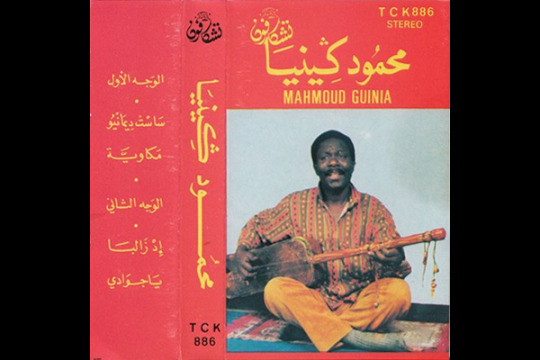
Mahmoud Guinia: self-titled debut (1989)
Reading the Arabic on any given vinyl, disc, or cassette cover means it's serious business. It was only two years ago when Omega WUSB had a great concept and decided to compile its first-ever African sounds expo; a result of being fanatics of Brian Shimkowitz' Awesome Tapes From Africa label. Obvious artists such as Hailu Mergia, Fela Kuti, Oum Kassoum, and William Onyeabor along with the African Scream Contest records and Mogadisco: Dancing Mogadishu comprised a substantial deal of that broadcast. Then you have artists like Essaouiran gnawa musician Mahmoud Guinia, master of the sintir / guembri: a three-string log guitar partially covered in animal skin. His deep bass-like strings and tribal backing band brought literal straight-up Moroccan heat with his debut. I agree with Shimkowitz on this one: it's a great stoner record. I envisioned that notion with catchy rhythms, tempo changes, and other instrumental elements producing baking-hot sounds all throughout Guinia's shouts that could jump out of nowhere at any time. Of the cassette's four tracks, "سَاسْتْ دِيمَانْيُو " was the one we went with and stood out as one of the more memorable ones that stayed with us. The end result? The African finds we ended up with gave us some distinct feels we will never forget.
#Mahmoud Guinia#Morocco#Brian Shimkowitz#Awesome Tapes From Africa#Essaouiran#Fela Kuti#William Onyeabor#Hailu Mergia#Oum Kassoum#wow#fire#heat#smoke#omega#music#mixtapes#reviews#playlists#cassettes#tapes
6 notes
·
View notes
Text

Super-hot Moroccan smoke.
6 notes
·
View notes
Text
Allah supreme: how Pharoah Sanders found freedom and rebellion in Islam | Pharoah Sanders | The Guardian
The day the music died was 24 September 2022. On that Saturday, the legendary tenor saxophonist Pharoah Sanders, a man who blew his horn “as if he was a dragon breathing fire”, passed on, at age 81. With his death came the end of a majestic era, a time of saxophone spirituality and musical mysticism that will probably never be surpassed or even replicated. Sanders, like so many of his generation, channeled spirit into song, drawing inspiration from a panoply of sacred sources.
For a while, younger hip-hop generations also found words and meaning in a similar kind of search, and the music –along with the quest – continued.
But jazz has changed and hip-hop has changed.

Never mind that only some of these artists adopted the faith itself. It was their notes and their tones that counted. Plaintive, modal, quarter-toned and chromatic, these aural landscapes of east and west and everything in between stretched the imaginations of both players and audiences. Inside the music, new alliances were forged between people and with all that was holy.
To some people, though, the music just seemed cacophonous and angry. White critics often didn’t understand. Even as astute a thinker as the English Marxist historian Eric Hobsbawm wrote, in 1959, that jazz’s “flight into Mohammedanism or some other non-white culture” was a way to “sidestep” a rising avant-garde jazz that was seeking white acceptance. Describing the era, Hobsbawm explained that “the marvelous political awakening of all the oppressed and underprivileged in Roosevelt’s America put a new tone into the jazz musician’s instrument: open resentment”.
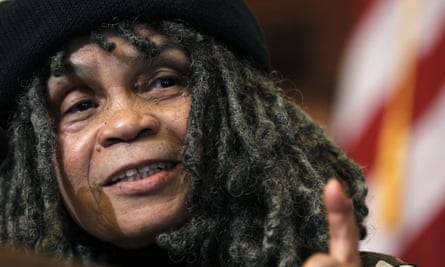
If all you heard during the long civil rights era was an endless blow of rage, you were missing out since you weren’t listening. The love was everywhere and all over the music. The piano player Ahmad Jamal told an interviewer: “I get my approach to life from the Holy Qur’an. I belong to the Ahmadiyya movement in Islam. Our motto is, ‘Love for all; hatred for none.’” (Many of the jazz musicians of that era came to Islam through the Ahmadiyya movement, a religious revivalist movement that began in late 19th-century India. It was led by Mirza Ghulam Ahmad, a charismatic reformer who believed he had received divine revelations that required him to promote the unity of all religions as manifest through Islam. Ahmadis came to the USA in the 1920s and found receptive audiences in African American communities.)
And it was a love supreme. I’ve argued elsewhere that Coltrane’s most famous song, A Love Supreme, has its own Islamic echoes (the chant “a love supreme” starts to sound a bit like “Allah supreme” after a while). Pharoah Sanders, who played with ’Trane starting in 1965, extended Coltrane’s legacy after his death in 1967.
Meanwhile, Sanders continued to build his own spiritually inflected, religious ecumenical style. His 1969 hypnotic track Hum-Allah-Hum-Allah-Hum-Allah meditates on the words “Prince of peace / Won’t you hear our pleas / And ring your bells of peace / Let loving never cease” for an enveloping and achingly beautiful 15 minutes. His classic The Creator Has a Master Plan had its own second coming when it was re-released in a trip-hop remix in the mid-90s. The Trance of Seven Colors, Pharoah’s work with the master Gnawa musician of Morocco Mahmoud Guinia is simply transcendent on an interstellar plane.
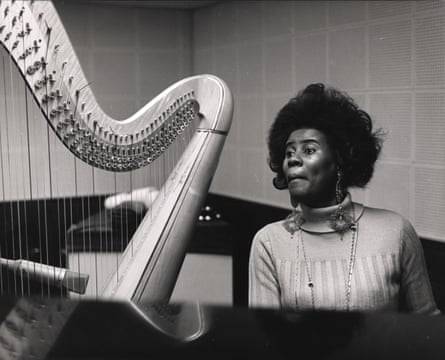
And it was a way of connecting to Africa. “The Christianity of the slave represented a movement away from Africa,” Amiri Baraka wrote in this classic text Blues People. “It was the beginning of Africa as ‘a foreign place’.” For the jazz musicians of this long and spiritual era, to reconnect with Africa was more than idle curiosity. It was a way of suturing back an essential part of you that had been forcibly torn from your collective body generations ago. By the mid-1950s and 1960s, African-themed events at nightclubs and restaurants in Brooklyn and Harlem abounded, with UN diplomats from newly independent African countries frequently dropping in. The jazz pianist and composer Randy Weston described the era: “Many of the African countries were just getting their independence. And the wonderful thing about being in New York, the United Nations is there. So I had an opportunity to meet many African diplomats. Many people from Kenya, from Nigeria, from Ghana, from Egypt, many parts of Africa. And I would always talk to them to try to understand a little more about the continent.”
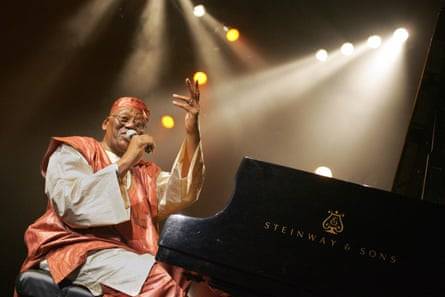
Weston eventually relocated to Morocco for about five years and traveled throughout the African continent before returning to the USA in 1972. “I went on a spiritual trip back home,” he told DownBeat magazine in 1998, referring to Africa. “I wanted to hear where I came from, why I play like I play, why we play music like we do. We went to about 18 countries, and wherever we went we asked to experience the traditional music of the people. Hearing the traditional music was like hearing jazz and blues and the Black church all at the same time.”
Weston also joined forces with master Gnawa musicians in Morocco. (He was playing with them and learning from them before Sanders did the same.) Others, such as Alice Coltrane, were moving in more eastern directions while still others, like Sun Ra, lived in intergalactic space and called us all to move in with him.
The spiritual jazz movement continued, but it didn’t take long for it to be eclipsed by other trends, everything from commercially accessible fusion, launched by the likes of Miles Davis, to the less accessible avant-garde innovations of Cecil Taylor or Albert Ayler. By the 1990s, jazz was also firmly ensconced in the ivory tower, featuring at prestigious arts institutions such as Lincoln Center and the Kennedy Center.
Still, the Islamic influence in American popular music never went away, though it did change addresses. Shifting from sound to word, Muslim references could now be found more in the new hip-hop than in the new jazz, even if hip-hop Islam was a yet more heterodox creed than the one found within the Ahmadiyya community. Foundational hip-hop artists including Rakim, Big Daddy Kane, and the Wu-Tang Clan were invoking the words and numbers of the Nation of Gods and Earths, an offshoot of the Nation of Islam.

Five Percenter language has permeated the pop cultural lexicon. For example, the “G” in “wassup, G?”is not “gangsta”, as many might think, but “God”. In this creed, Five Percenter men are considered Gods, and Five Percenter women are known as Earths. “Dropping science” is a term from the Five Percenters, as is the emphatic term “word”, a short form of “word is my bond”.
Scholars have written on the important influence of Five Percenters on early hip-hop. But there are also other, more mainline Muslim influences on the American scene. Five Percenter doctrine was foundational in hip-hop, but it operated as an esoteric language among the educated and enlightened. The way the language and numerology (with an emphasis on the number 7) operated was to signify kinship and belonging, which was particularly important in the early hip-hop years. But other Muslim rappers, often associated with Sunni Islam, performed their deen, their faith, more in line with the jazz tradition that preceded it, as a search for self.

Mos Def is hardly the only one who invokes this devotional search. A Tribe Called Quest’s Q-Tip (Kamaal Fareed) is another. “Praise the Lord of the worlds that’s unseen / Respect me for that and let me do my thing,” we hear in the song Get a Hold. More recently, the Five Percenters, the Nation of Islam, and Sunni Islam (and more) tentatively unite to find a home in the lyrical power of Jay Electronica. “All I have in this world is my flag and my sword / I’m on the battlefield with the flag of my Lord,” rhymes Electronica in Fruit of the Spirit. “My shahada is my cantada / My heart chakra light up when I make sajda at fajr.”
While spiritual quests such as Jay Electronica’s aren’t as common in today’s hip-hop, the search hasn’t disappeared entirely. After all, the history of Black music shows us time and again how the journey seeking the divine produces such a profound musical experience.
And that’s what Pharoah Sanders leaves behind. His was an unyielding search for a way to transcend the secular ugliness of this world, and with his passing Sanders may have finally achieved that goal. Yet music – like all that is holy – never dies. And Pharoah’s saxophone will honk and shriek and envelop all our senses, reverberating to heaven and back, and maybe even beyond.
#Islam#Pharoah Sanders#how Pharoah Sanders found freedom and rebellion in Islam#Nation of Islam#5% Nation of Islam#Sunni Islam#Five Percenters#jay electronica#mos def#rakim big daddy kane#John Coltrane#St John Coltrane#Alice Coltrane
3 notes
·
View notes
Audio
I recently picked up a copy of this album. I’ve really loved gnawa music ever since I heard Mahmoud Guinia. His music truly changed the way I thought about and heard music.
1 note
·
View note
Text
THIS IS GRAEME PARK: LONG LIVE HOUSE RADIO SHOW 13JAN23
LONG LIVE HOUSE RADIO SHOW 13JAN23
In this week’s Long Live House Radio Show:
Kyodai
Lovebirds feat. Declam McDermott
Third Attempt
Angelo Ferreri & Hatiras
Lonely C feat. Kendra Foster
Joy Orbison & Léa Sen
Fingers Inc.
Farley “Jackmaster” Funk
Ragtyme feat. Byron Stingily
Cultural Vibe
Loleatta Holloway
Inner City and more.
LONG LIVE HOUSE RADIO SHOW 13JAN23
Title (Mix), Artist
Mimoun Marhaba, Maalem Mahmoud Guinia & Floating Points
4U, Kyodai
Mar-A-Lago, Lovebirds feat. Declam McDermott
Love Star, Third Attempt
I Can Be Your Love, Angelo Ferreri & Hatiras
I Ain't Worried (Zopelar Remix), Lonely C feat. Kendra Foster
Better, Joy Orbison & Léa Sen
Believe in Love, Mr. Root
It's Not Over, Tuccillo
Remember The Funk, Scotty Boy
I Am One, I Am Many (Adelphi Music Factory Remix), James Curd
Come Get My Lovin' (Remix), Dionne
Da Bango, Todd Terry Project
House Of Love (The Raise Your House Mix), Smooth Touch
It's Over (Dub), Fingers Inc.
U Ain't Really House (Really Instrumental), Farley "Jackmaster" Funk
I Can't Stay Away (Powerhouse Mix), Ragtyme feat. Byron Stingily
Ma Foom Bey (Love Chant Version), Cultural Vibe
The Morning After (Club Mix), Fallout
Let's Get Brutal (Cotto AIM Mix), Nitro Deluxe
Love Sensation (Dr Packer Remix), Loleatta Holloway
Share My Life (Graeme Park Vocal Mix), Inner City
1 note
·
View note
Video
youtube
mahmoud guinia --سَاسْتْ دِيمَانْيُو
2 notes
·
View notes
Photo




Emanative Lockdown Selection
UK drummer and producer emanative graces us with a lockdown selection, spanning newly unearthed spiritual jazz offerings and recent electronic releases, from Pharoah Sanders to Alabaster dePlume via Acid Arab.
Dig in here:
#emanative#quarantine selection#isolation selection#floating points#acid arab#colectivo futuro#four tet#pharoah sanders#alabaster deplume#sarathy korwar#gnawa#jazz#mahmoud guinia
1 note
·
View note
Photo

The cosmos has been graced by a new star - Maallem Mahmoud Guinia - gently shimmering in the distance. The master musician from Morocco passed away August 2, 2015 at the age of 64.
1 note
·
View note
Text
# 3,807
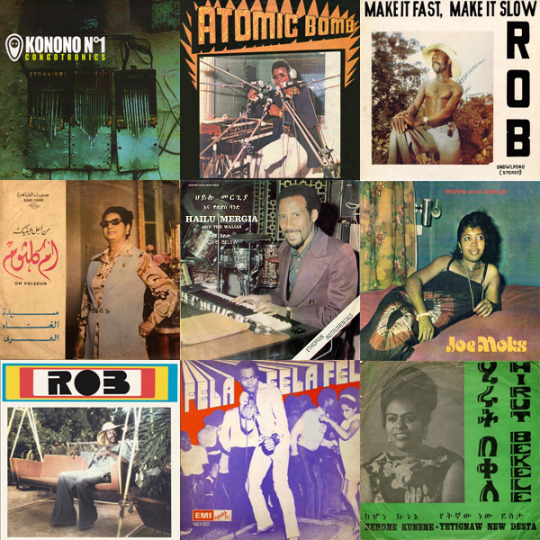
Omega Radio for August 25, 2021; #280.
Joe Moks: “Boys And Girls”
William Onyeabor: “Atomic Bomb”
Rob (Raindorf): “Just One More Time”
Fela Kuti: “Gentleman”
Konono No. 1: “Lufuala Ndonga”
Oum Koulsoum: Rak El Habib side 1
Salah Mustafah: ???
Hallo Dawe: “Neighbors”
Francis Bebey: “Di Saegi”
Charles A. Chepwonky: “Kas Imam O Pilista”
Roha Band: ???
Vumani: “Guy Fawkes”
Kweysha Seta: ???
Mahmoud Ahmed w. Roha Band: “Endet Nesh Belulign”
Kuku Sebsebe: “Eche Nech Hagere”
Hirut Bekele: “Lishikem Fiker”
Aster Aweke: “My Beggar’s House”
Getatchew Mekurya: “Tezeta”
Bereket Mengistaeb: ”Lebay”
Alhaja Queen Salawa Abeni & Her Waka Moderniser: “Mo Ti Goke”
Mahmoud Guinia: ???
Sengerema (Kagunga) S.D.A. Choir: “Simba Wa Yuda”
Oriango & Kipchanga: “Sukulit Ab Musoknotet”
Tislatin Onzar: 3=2+1 side A
Bonus Omega; first-ever African cassette / vinyl expo-.
#omega#music#mixtapes#reviews#playlists#Africa#wow#whoa#damn#William Onyeabor#Rob#Fela Kuti#Konono No. 1#Oum Koulsoum#Hallo Dawe#Hirut Bekele#Aster Aweke#Hailu Mergia#Aby Ngana Diop#Awesome Tapes From Africa#Joe Moks
8 notes
·
View notes
Text

Straight-up Moroccan heat.
4 notes
·
View notes
Text
AUGUST 25, 2021 (#280)

Joe Moks: “Boys And Girls”
William Onyeabor: “Atomic Bomb”
Rob (Raindorf): “Just One More Time”
Fela Kuti: “Gentleman”
Konono No. 1: “Lufuala Ndonga”
Oum Koulsoum: Rak El Habib side 1
Salah Mustafah: ???
Hallo Dawe: “Neighbors”
Francis Bebey: “Di Saegi”
Charles A. Chepwonky: “Kas Imam O Pilista”
Roha Band: ???
Vumani: “Guy Fawkes”
Kweysha Seta: ???
Mahmoud Ahmed w. Roha Band: “Endet Nesh Belulign”
Kuku Sebsebe: “Eche Nech Hagere”
Hirut Bekele: “Lishikem Fiker”
Aster Aweke: “My Beggar’s House”
Getatchew Mekurya: “Tezeta”
Bereket Mengistaeb: ”Lebay”
Aby Ngana Diop: “Nadme”
Alhaja Queen Salawa Abeni & Her Waka Moderniser: “Mo Ti Goke”
Mahmoud Guinia: ???
Sengerema (Kagunga) S.D.A. Choir: “Simba Wa Yuda”
Oriango & Kipchanga: “Sukulit Ab Musoknotet”
Tislatin Onzar: 3=2+1 side A
Tonight for the first time ever, Omega Radio presents its African music expo-; something we’ve never done before. Showcased here is our favorite finds in rare and obscure sounds on cassette and vinyl. It’s the result of discovering new standouts through our favorite labels, dee-jays, and while assembling our bonus classic vinyl-treasure broadcasts.
Some sounds heard on tonight’s show courtesy of Awesome Tapes From Africa.
Our African music expo- returns next summer. Thanks to everyone tuning in Omega.
August 28, 2021 (10PM New York City): final Summer deluxe Omega
August 30, 2021 (10PM New York City): final Summer (bonus) Omega
#omega#music#playlists#Africa#vinyl#cassettes#Fela Kuti#William Onyeabor#Awesome Tapes From Africa#wow#whoa#damn
5 notes
·
View notes
Audio
Morning soundtrack Maalem Mahmoud Guinia / Floating Points / James Holden – Marhaba.
1 note
·
View note
Audio
Floating Points / James Holden / Maalem Mahmoud Guinia - Mimoun Marhaba
#Floating Points#James Holden#Maalem Mahmoud Guinia#electronic#world#Sam Shepherd#eglo#Border Community#soundcloud
8 notes
·
View notes
